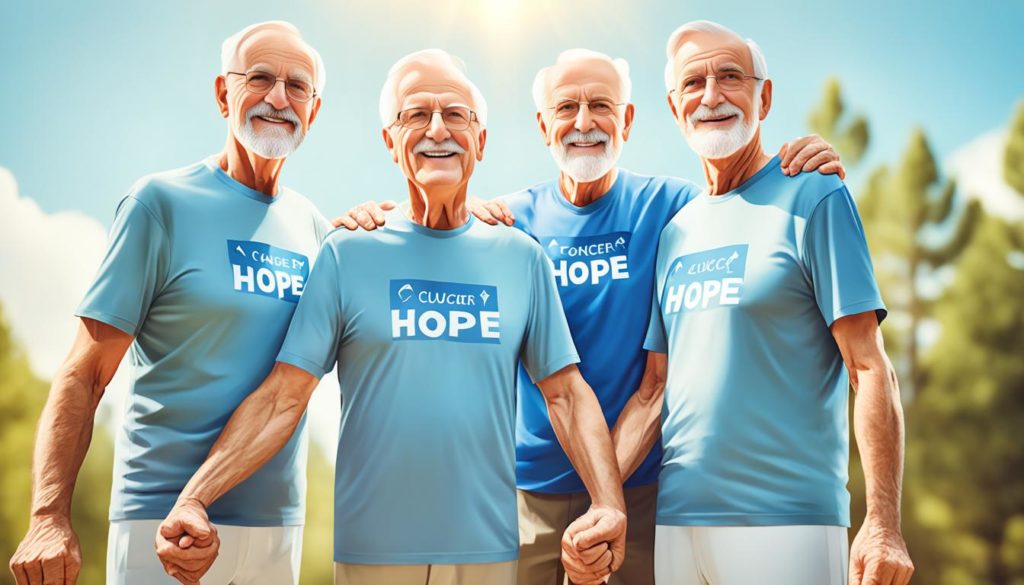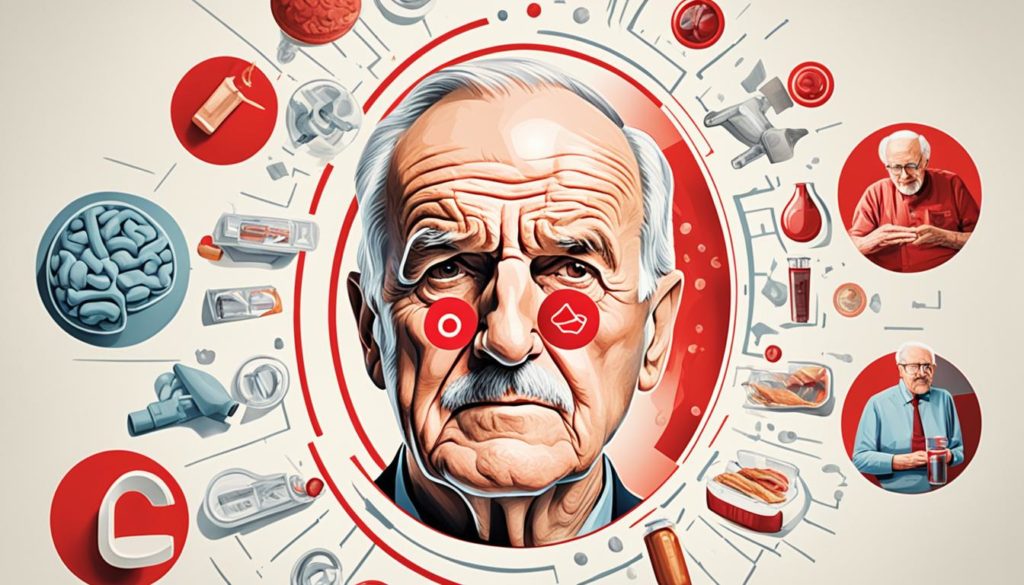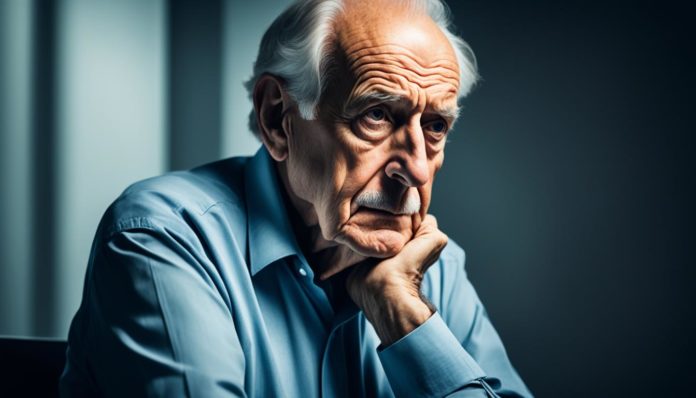Did you know that nearly 60% of prostate cancer cases are diagnosed in men over 65? This fact shows the special challenges elderly men face with prostate cancer. Knowing the risks and how to manage them can really help improve their lives and treatment results.
Elderly men with prostate cancer have unique concerns. This is because of their age and the higher death rates from the disease. The risk of getting prostate cancer goes up with age, making it a big health issue for older men.
As men get older, it’s key to weigh the good and bad of treatment. They must consider their age, other health problems, and how well they can handle treatment. It’s important to make care plans that fit the needs of older patients. This means focusing on both medical treatments and care that supports their well-being.
Key Takeaways
- Nearly 60% of prostate cancer cases are diagnosed in men over 65.
- Elderly men prostate cancer presents distinct challenges due to age-specific factors.
- Balancing treatment benefits and risks is crucial for seniors.
- Management strategies should prioritize improving quality of life.
- Supportive care practices are essential for elderly prostate cancer patients.
Understanding Prostate Cancer in Older Adults
Prostate cancer is a big health issue for older adults. As people get older, the chance of getting prostate cancer goes up a lot. It’s important to know how age affects the disease’s spread and growth.
Why Age is a Major Risk Factor
Men over 50 see a big jump in prostate cancer cases. Studies show most men get diagnosed around 66 years old. This means older men are at a higher risk of getting prostate cancer.
Men over 70 are more likely to get serious prostate cancer than younger men. This risk goes up with age because of changes in the body and being exposed to harmful substances for a longer time.

Differences in Prostate Cancer by Age Groups
Prostate cancer changes in different ways for men of various ages. Younger men often get less severe cancer and have better treatment results. But, older men usually get more serious and hard-to-treat cancer, which can be deadly.
It’s key to tailor treatments to a person’s age and health when dealing with prostate cancer in older adults.
| Age Group | Risk Level | Common Prostate Cancer Characteristics |
|---|---|---|
| Below 50 | Low | Less aggressive forms, higher treatment success |
| 50-69 | Moderate | Increased incidence, mixed treatment outcomes |
| 70 and above | High | More aggressive, advanced stages, higher mortality rates |
Common Risk Factors for Prostate Cancer in the Elderly
It’s vital to know the risks of prostate cancer for older adults. This helps with early detection and prevention. Key factors include genetic traits and lifestyle choices.

Genetic and Family History
Genetic risks for prostate cancer come from certain inherited genes. Men with a family history of the disease face a higher risk. This is especially true if a father or brother had it.
African American men are at an even higher risk. They should watch their health closely and consider genetic counseling.
Lifestyle and Dietary Habits
Older men can lower their prostate cancer risk by changing their diet and lifestyle. Eating too much fat and animal proteins can increase risk. Instead, eat more veggies, fruits, and whole grains.
Regular exercise and keeping a healthy weight are also key. These habits help prevent prostate cancer.
Symptoms of Prostate Cancer in Elderly Men
Finding signs of prostate cancer in older men can be hard. Many symptoms look like other health issues, like BPH. It’s key to spot these signs early to help treat prostate cancer in senior men quickly.
Signs that might mean prostate cancer is present in older men include:
- Difficulty in urinating
- Frequent urination and nocturia
- Blood in urine or semen
- Painful ejaculation
- Lower back or pelvic pain
But, prostate cancer in its early stages often doesn’t cause symptoms. This makes finding the disease early hard. That’s why regular check-ups and doctor visits are so important for older men.
Regular tests can catch prostate cancer early. This helps with treatment and managing the disease. Older men should talk to their doctors about any changes in how they urinate or feel pain. This helps spot prostate cancer signs early and get the right treatment.
Screening for Prostate Cancer in Older Adults
Screening for prostate cancer in elderly men is key to managing the disease well. Finding prostate cancer early can greatly improve treatment success. This shows why it’s vital to tailor screening to each person’s needs.
Importance of Early Detection
Finding prostate cancer early can lead to better health outcomes. Doctors often use the PSA test for this purpose. However, the decision to screen should think about the patient’s overall health. For older men, it’s important to weigh the benefits of early detection against the risks of over-diagnosis and over-treatment.
Screening Guidelines and Recommendations
Guidelines say men with a life expectancy of at least ten years should think about screening. These guidelines aim for a balanced approach. They look at the benefits of finding cancer early and the downsides of screening on quality of life. Doctors should talk with elderly men about the pros and cons of screening to help them make informed choices.
| Screening Tool | Benefits | Risks | Recommendations |
|---|---|---|---|
| PSA Test | Early detection of aggressive cancer | Risk of over-diagnosis | Consider for men with life expectancy >10 years |
| DRE (Digital Rectal Exam) | Simple and quick | Discomfort, less sensitive | Used in conjunction with PSA for better accuracy |
Prostate Cancer Treatment Options for Seniors
When looking at Prostate Cancer Treatment for Seniors, we must think about the cancer stage, the patient’s health, and what they prefer. There are many options, from strong treatments to more gentle ones. These choices aim to fight cancer while keeping the patient’s quality of life good.
Hormone Therapy
Hormone Therapy Prostate Cancer helps stop cancer cells from growing by lowering or blocking hormones that make them grow. But, it’s important to know that older patients might face side effects like high blood pressure, diabetes, and heart problems.
Surgery and Radiation Therapy
Some seniors might need surgery or radiation therapy. These treatments try to get rid of cancer cells but have risks too. These risks include complications after surgery and health issues because of age. Deciding on these treatments should be done with a doctor, thinking about the patient’s health and goals.
Active Surveillance and Watchful Waiting
For slow-growing prostate cancer or low-risk cases, Active Surveillance in Prostate Cancer might be the best choice. This way, doctors keep an eye on the cancer without treating it right away. It helps avoid unnecessary treatments and keeps the patient’s quality of life high. This is especially good for seniors who have other health issues already.
Prostate Cancer Elderly
Managing Elderly Prostate Cancer needs a caring approach. It must balance treatments with support. Older patients have special needs that must be considered for effective care. It’s important to look at their health, mental function, and nutrition.
An integrated approach helps avoid too much or too little treatment. Too much treatment can harm quality of life. Not enough treatment might miss chances for relief and cure. It’s key to focus on geriatric assessment in treatment plans.
- Medical Treatments: Tailored to the patient’s health and needs.
- Supportive Care: Includes physical therapy, diet advice, and checking cognitive function.
- Psychosocial Support: Crucial for the mental health of elderly patients.
For the best care, healthcare teams must work together. They need to meet each patient’s full range of needs.
The table below shows important points for caring for elderly prostate cancer patients:
| Key Area | Considerations |
|---|---|
| Comorbidities | Identifying and managing other health conditions for better treatment plans. |
| Physical Function | Checking how well patients move and their physical health for the right treatments. |
| Cognitive Function | Looking at mental health and thinking skills to make care more personal. |
| Nutritional Status | Watching diet and nutrition to help patients stay well. |
Caring for Elderly Men with Prostate Cancer
Looking after older men with prostate cancer means focusing on their special needs. It’s key to look after both their body and mind. This ensures they get the best care possible.
Managing Treatment Side Effects
Older men with prostate cancer face many side effects that can really lower their quality of life. It’s vital to manage these side effects well to keep them healthy. Some common problems include:
- Urinary incontinence: This can be helped with exercises, medicines, or surgery if it’s very bad.
- Sexual dysfunction: There are treatments like medicines, devices, or counseling to help.
- Bone weakening: Regular bone checks and medicines like bisphosphonates can reduce this risk.
Supporting Mental Health and Wellbeing
Helping with Mental Health Support Prostate Cancer is a big part of caring for older men. Many cancer patients feel sad or anxious, which can make it hard to stick to treatment. A team approach helps a lot:
- Oncologists: They make sure the treatment is right.
- Geriatricians: They adjust care for older patients.
- Mental health professionals: They offer counseling and support groups.
- Nutritionists: They make diet plans to help with health and treatment.
With these steps, we can make Prostate Cancer Care for Elderly men better. This helps improve their health and life quality.
Prevention Tips for Prostate Cancer in the Elderly
Adopting Healthy Lifestyle Choices is key for Prostate Cancer Prevention Elderly. There’s no sure way to stop prostate cancer, but eating right and staying active can help lower the risk. Here are some important tips:
- Dietary Modifications: Eat less fat, especially from animals. Add more fruits, veggies, omega-3s, soy, and green tea to your meals. Stay away from charred meats as they can up your cancer risk.
- Mental and Physical Health: Exercise regularly and keep a healthy weight. Drinking less alcohol and quitting smoking also boosts your health.
- Vitamin D and Sexual Activity: Getting enough vitamin D and staying active in bed may also help protect you.
- Personalized Pharmaceutical Interventions: If you’re at high risk, talk to your doctor about DHT-lowering drugs. They might be right for you. Always check with a healthcare expert for the best prevention plan for you.
Small, steady changes in your life can really add up to big benefits in lowering prostate cancer risk. This approach helps prevent cancer and boosts your health and happiness, especially as you get older.
| Healthy Lifestyle Choices | Impact on Prostate Cancer Risk |
|---|---|
| Reduced fat intake | Lowered cancer risk |
| Increased fruits and vegetables | Added protective nutrients |
| Regular exercise | Improved immune function |
| Moderate alcohol consumption | Reduced cancer-promoting inflammation |
| Smoking cessation | Decreased carcinogen exposure |
Focus on a full health plan to make big steps in Prostate Cancer Prevention Elderly. It’s not just about avoiding cancer. It’s about living a balanced life that keeps you healthy as you age.
Conclusion
Managing prostate cancer in the elderly needs a careful plan. It must consider their unique risks, symptoms, and treatment options. It’s important to balance life expectancy, treatment effectiveness, personal choices, and keeping quality of life good.
Early detection is key, thanks to proactive screening programs. These programs show how catching cancer early can greatly improve results. For optimal prostate care seniors, early detection is vital.
Using treatments like hormone therapy, surgery, radiation, and active surveillance helps tailor care to each patient’s needs. It’s also important to manage side effects and support mental health. This approach helps with both the physical and emotional health of elderly patients.
Preventive strategies are crucial for managing prostate cancer risk in the elderly. By focusing on informed, personalized care, healthcare providers can improve health outcomes and dignity for senior men. Studies highlight the need for a prostate cancer elderly summary to guide these efforts.
FAQ
Why is age a major risk factor for prostate cancer in older adults?
Age is a big risk factor because prostate cancer gets more common with age. Men over 70 are more likely to get it. This makes age a key risk factor.
What are the common risk factors for prostate cancer in the elderly?
Risk factors include family history and being African American. Eating too much fat and animal proteins also increases risk. But eating well and staying at a healthy weight can lower it.
How does prostate cancer in the elderly differ from younger age groups?
In older men, prostate cancer is often more advanced and deadly. Treatment choices depend on biological age, not just how old someone is.
What are the symptoms of prostate cancer in elderly men?
Symptoms include trouble peeing, needing to pee a lot, and waking up to pee. You might also see blood in your pee or semen, have painful ejaculation, or feel pain in your lower back or pelvis. Some early cancers don’t show symptoms, so regular check-ups are important.
How important is early detection of prostate cancer in older adults?
Finding prostate cancer early is key to managing it well. Doctors use PSA tests to check for it. The decision to screen depends on how long someone is expected to live, their health, and the risks and benefits.
What screening guidelines and recommendations exist for prostate cancer in the elderly?
Doctors suggest screening for prostate cancer if someone is likely to live at least ten more years. It’s important to weigh the risks of finding cancer that might not need treatment against the benefits of early detection.
What treatment options are available for prostate cancer in seniors?
There are many treatments, like hormone therapy, surgery, and radiation. Some men with slow-growing cancer might just watch and wait to keep their quality of life.
How can elderly men with prostate cancer manage treatment side effects?
Side effects like losing control of urine, having trouble with sex, or weak bones are big concerns for older men. A team of health experts can help with care plans that meet each person’s needs.
How can supporting mental health benefit elderly men with prostate cancer?
Helping with mental health is crucial because many men feel sad or anxious after a cancer diagnosis. Good mental support can help them stick to their treatment and live better.
What are some prevention tips for prostate cancer in the elderly?
Eating right and staying active can lower the risk of prostate cancer. Choose foods low in fat, eat more fruits and veggies, and avoid burnt meats. Keep a healthy weight, exercise, and drink less alcohol. Quitting smoking and getting enough vitamin D are also good ideas.


